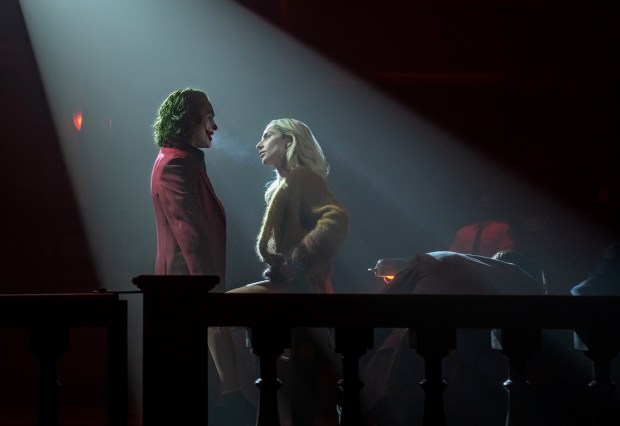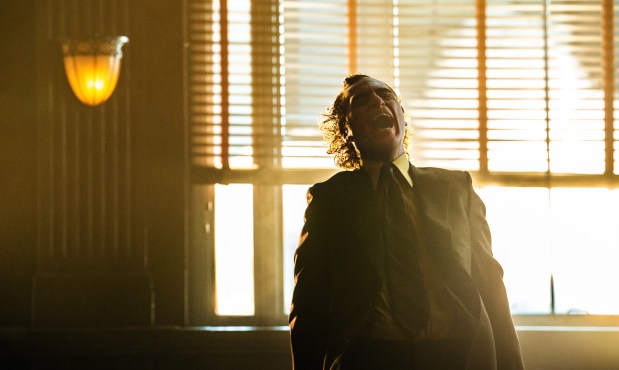The average sequel to a huge commercial success doesn’t try much of anything. Director Todd Phillips knows this. He is, after all, the director of all three “Hangover” movies.
Surprise! “Joker: Folie à Deux” is a lot of things, but a pro forma sequel it is not. This genuinely nervy jukebox musical (?) (!), very nearly a rebuke of the 2019 billion-dollar smash starring Joaquin Phoenix, feels like its own thing, considerably less derivative and more fully realized than the first one. And it’s sure to outright alienate millions who dug the earlier film’s grinding intensity and morally queasy vigilante spirit.
That one threw several New York-as-hellhole movies, from “Death Wish” to “Taxi Driver” to “The King of Comedy,” into a trash compactor and out came the “Joker” script, made screenworthy by Phoenix, giving his all. It arrived three years into a U.S. presidential administration full of daily reminders of what celebrity worship can lead to. The time was right for a truly nasty foray into Gotham, and into the head-space of pathological party clown and aspiring comedian Arthur Fleck, whose perpetual victimization could only lead to carnage.
“Joker: Folie à Deux” makes Fleck pay the piper. It’s a comeuppance with musical numbers. Returning screenwriters Scott Silver and director Phillips begin with Fleck behind bars at Arkham State Hospital, struggling with his warring personality disorder, the tormented abuse survivor Fleck in one corner, and Fleck’s now-notorious alter ego, Joker, in the other.
Fleck’s lawyer (Catherine Keener) is working up an insanity defense for his upcoming murder trial, to be prosecuted by DA Harvey Dent (Harry Lawtey). Life in Arkham is no life at all, and Phoenix appears to have undergone even more severe weight loss in the name of his craft this time, all the better to suggest a broken, undernourished soul. Then, one day, Fleck spies Lee Quinzel, Arkham’s newest resident played with dark relish by Lady Gaga. She’s first seen leading a music therapy class. She fixes him with a gaze that says: I’m a huge fan of your work. It’s love at first sight, and a spiritual marriage of two crazy kids whose mutual ambitions of greatness are, to quote Rodgers and Hammerstein, bustin’ out all over.
Bustin’ out of Arkham, at least temporarily, Fleck and Quinzel paint the town, wreak some havoc and imagine themselves as a musical duo for the ages. In the stylistic vein of the film version of “Chicago,” the “Joker” sequel frames its production numbers as sung-through and sometimes danced-through interior monologues — sometimes realistic, sometimes fantastic, often a little of both. Gaga is excellent throughout, and this time Phoenix isn’t the whole show. Gaga’s original songs fold naturally into the film’s stream of standards, ranging from Jacques Brel (“If You Go Away”) to Rodgers and Hart (“Bewitched, Bothered and Bewildered”) to, inevitably, “The Joker” (“The Roar of the Greasepaint — the Smell of the Crowd”). Quinzel imagines herself a Gotham Judy Garland; at one point, this pair of born entertainers become Sonny and Cher knockoffs, hosting their own variety hour.
The storyline is spare to the point of invisibility this time, reportedly revised with input, musical and otherwise, from Gaga and Phoenix as production commenced. In the later courtroom sequences, in Gotham’s trial of the century, Fleck represents himself, apparently channeling Foghorn Leghorn; in Arkham, the inmates are always watching cartoons, with particular emphasis on that skunky predator Pepé Le Pew.
Daringly, the sequel forces Fleck to reckon with all he has wrought, and the rabid nature of his acolytes. Quinzel sees these bloodthirsty fans as crossover potential for her own aspirations to domestic terrorism with style. With the film’s canny reliance on the Great American Songbook, and the clever way composer Hildur Guðnadóttir interpolates themes such as the Carpenters standard “Close to You” into the background music, “Joker: Folie à Deux” is the arresting duets album Gaga never got to do with Tony Bennett.

So who’s up for a strange, disarming musical? As much as I hated the first one, this one works for me. Phillips’ second go at this malignant universe hews more closely in concept to Dennis Potter’s “Pennies From Heaven” than the classic Old Hollywood MGM titles either shown (at one point, our lovebirds watch the Fred Astaire/Cyd Charisse gem “The Band Wagon”) or musically referenced. There’s not much narrative propulsion this time, no steady build to Fleck’s righteous, Travis Bickle-y revenge. What we get is more interesting, and confrontational: A schism of a man, Lady Macbeth-ed by a heat-seeking, fame-hungry songstress devil, forced to face the music and the fallout of his own criminal celebrity.
The title “Joker: Folie a Deux” sounds like a joke, though it refers to a clinical psychiatric definition of shared psychological delusion, or “double madness.” By the time Zazie Beetz (Sophie, Fleck’s romantic obsession) and Leigh Gill (Gary, Fleck’s only friend) testify in court, it’s clear Phillips and company aren’t kidding. They probably know their movie’s not just simply not for everyone, but it’s not even for most of the first film’s champions. Given the frightening degree to which the 2019 “Joker” saga gave audiences what they wanted, can a morning-after mea culpa find any takers in 2024?
“Joker: Folie à Deux” — 3 stars (out of 4)
MPA rating: R (for some strong violence, language throughout, some sexuality, and brief full nudity)
Running time: 2:18
How to watch: Premieres in theaters Oct. 3
Phillips is a Tribune critic.





